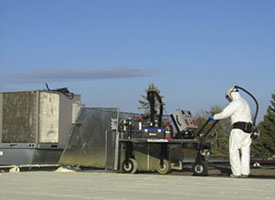
Understanding commercial roofing materials empowers a commercial roofing contractor to deliver optimal solutions for diverse building requirements. You can make better choices for your Hillsdale, MI commercial asset by understanding the strengths behind the most common options. For more assistance, or to schedule a consultation with the experts, call us today at 517-617-6953.
Single-Ply Roofing Options
Here’s a comprehensive overview of today’s leading commercial single-ply roofing options.
Single-Ply Membranes
TPO (Thermoplastic Polyolefin) offers a host of benefits for many commercial roofing applications.
- Superior heat and UV resistance
- Cost-effective installation
- Energy-efficient white surface
- 20-30 year lifespan
- Limited chemical resistance
PVC (Polyvinyl Chloride) is a lightweight, yet strong and durable single-ply membrane option. With specific characteristics worthy of consideration.
- Exceptional chemical resistance
- Heat-welded seams
- High durability
- Fire resistant
- Premium pricing
EPDM (Ethylene Propylene Diene Monomer), commonly known as “rubber roofing” is a traditional system with years of historical performance.
- Extended lifespan (30+ years)
- UV resistant
- Lower material cost
- Fewer seams required
- Limited color options

Factors to Consider
Part of choosing the right single-ply roofing system involves assessing numerous factors including:
Installation Considerations
- Building code requirements
- Local climate conditions
- Roof deck structure
- Budget constraints
- Energy requirements
- Warranty specifications
Performance Factors:
- Weathering Resistance
- UV exposure tolerance
- Temperature fluctuation handling
- Wind uplift resistance
- Impact resistance
- Chemical exposure protection
Energy Efficiency
- Solar reflectivity
- Thermal emittance
- Insulation compatibility
- Cool roof ratings
- Energy code compliance
Installation Requirements
- Substrate preparation
- Temperature limitations
- Equipment needs
- Crew certification
- Quality control measures
Maintenance Implications
- Inspection frequency
- Repair methods
- Cleaning requirements
- Life expectancy
- Warranty compliance
Professional Commercial Roofing Contractor
Success in your commercial roofing solutions demands thorough material knowledge, proper installation techniques, and understanding of building-specific requirements from your chosen roofing partner. Commercial Roofing Contractors must stay current with material innovations and installation best practices to deliver optimal roofing solutions.
To learn more, or to speak with our experts about your commercial roofing needs, call today at 517-617-6953.
Frequently Asked Questions
Q: Which roofing material has the longest lifespan?
A: Metal roofing systems typically last 50+ years, followed by PVC and EPDM at 25-30 years.
Q: What’s the most energy-efficient roofing material?
A: White TPO and PVC membranes offer highest solar reflectivity, typically reflecting 85%+ of solar radiation.
Q: How do costs compare between materials?
A: From lowest to highest: EPDM, TPO, Modified Bitumen, PVC, BUR, Metal Roofing.
Q: Which material is best for chemical resistance?
A: PVC offers superior chemical resistance, ideal for restaurants and industrial facilities.
Q: Are these materials compatible with solar installations?
A: TPO, PVC, and metal roofing systems work well with solar installations. Some manufacturers offer integrated mounting solutions.
